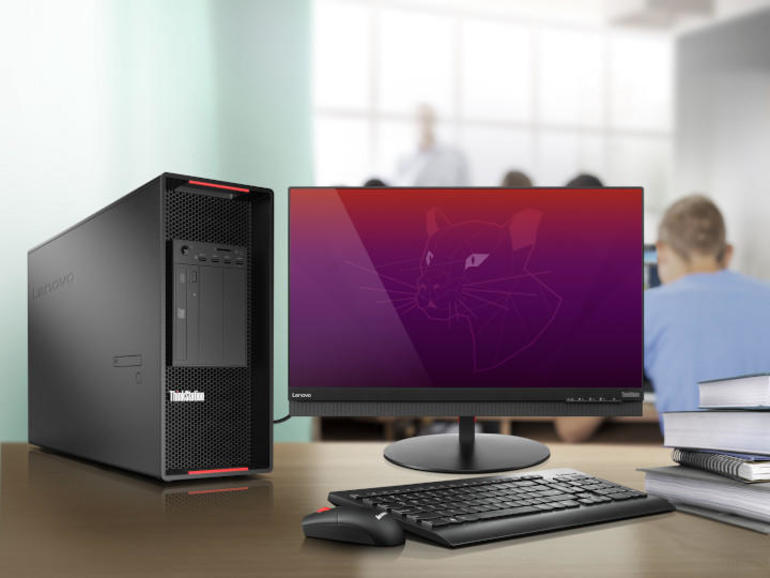The Linux desktop may never be as popular as the Windows desktop, but more top-tier computer OEMs are now offering a broad assortment of Linux desktops. In the latest move, Lenovo, currently the top PC vendor in the world according to Gartner, will roll Ubuntu Linux 20.04 LTS out across 30 of Lenovo’s ThinkPads and ThinkStations.
Wowser!
While Lenovo started certifying most of its laptop and PC line on the top Linux distributions since June 2020, this is a much bigger step. Now, instead of simply acknowledging its equipment will be guaranteed to run Linux, Lenovo’s selling Ubuntu Linux-powered hardware to ordinary Joe and Jane users.
Previously, you could only buy most of these machines if you were a business and had specified you wanted Ubuntu on a customized bid. Now, nearly 30 Ubuntu-loaded devices will now be available for purchase via Lenovo.com. These include 13 ThinkStation and ThinkPad P Series Workstations and an additional 14 ThinkPad T, X, X1, and L series laptops, all with the 20.04 LTS version of Ubuntu. The one exception will be the L series, which ships with version 18.04 LTS.
Igor Bergman, vice president of PCSD software and cloud at Lenovo, said:
“Lenovo’s vision of enabling smarter technology for all really does mean ‘for all.’ Our announcement of device certification in June was a step in the right direction to enable customers to more easily install Linux on their own. Our goal is to remove the complexity and provide the Linux community with the premium experience that our customers know us for. This is why we have taken this next step to offer Linux-ready devices right out of the box.”
These machines, which will be available around the world, starting in September 2020 and rolling out in phases through 2021, are:
Today, there are five Ubuntu-ready computers for sale. These include:
ThinkStation P520: Two high-end workstations powered by 3.30 GHz Intel Xeon W-2155 processors and have prices starting at $8,699.ThinkStation P920: A pair of even, more powerful desktop powerhouses that come with two 3.30 GHz Intel Xeon Gold 6234 CPUs, 192GBs of RAM, and two NVIDIA Quadro RTX 6000 with 24GBs of RAM graphics cards. These start at an eye-watering $19,719. On the other hand, you’ll have to look long and hard for any comparably powerful workstations. ThinkStation P720: A much more affordable workstation. With an Intel Xeon Silver 4110 Processor, its price starts at $2,493.42.
Both Canonical, Ubuntu’s parent company, and Lenovo sees this new line of Linux-enabled machines being ideal for today’s programmers, software developers, and artificial intelligence and machine learning professionals. And, of course, ordinary users who want a professional-grade, secure operating system.
As Rob Herman, Lenovo’s general manager of the Workstation & Client AI group, said when Lenovo announced its return to fully supporting the Linux desktop:
“More than 250 million computers are sold each year and NetMarketShare reports that roughly 7.2 million users are using those computers to run Linux. Once thought of as a niche IT crowd, this user base of data scientists, developers, application engineers, scientists, and more is growing — stepping into sought-after roles across multiple industries and becoming essential within their companies.”
Canonical CEO Mark Shuttleworth saw this coming. In April 2019, Shuttleworth said, “We have seen companies signing up for Linux desktop support because they want to have fleets of Ubuntu desktop for their artificial intelligence engineers.”
For these power-hungry users, Ubuntu Desktop 20.04 LTS comes with many improvements.
Nvidia GPUs work out the box with hardware drivers included by default.Access to a library of popular apps including Visual Studio Code, Slack, Spotify, Plex, and the JetBrains portfolio through the Snap Store.
The latest stable versions of the tools developers need — Ruby 2.7, Python 3.8, and GCC 9.3.
Built-in WireGuard Virtual Private Networking (VPN).
Get your workstation or laptop looking how you like it with a new theme and light/dark modes.
Control WiFi, wallpaper, and application with ease, through a revamped GNOME Settings menu.
No one’s predicting a “Year of the Linux desktop.” Companies such as Dell and Lenovo aren’t predicting such a game-changing event, but they’re selling largely to enterprise companies, which have seen the virtues of using high-end Linux desktops for powerful, forward-looking technologies such as AI, ML, containers, and cloud-native computing.



